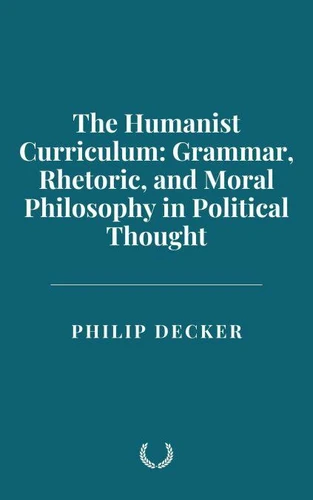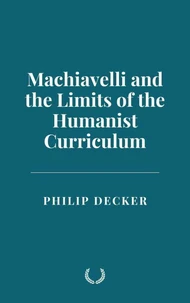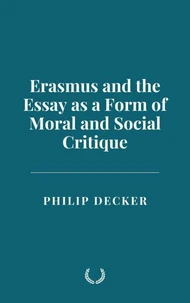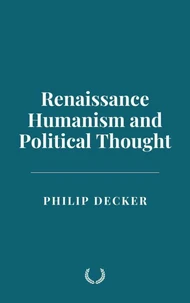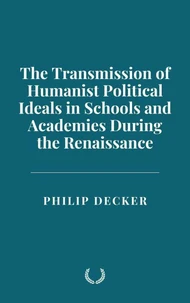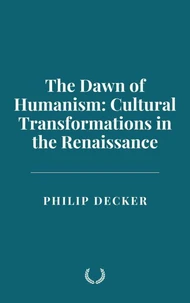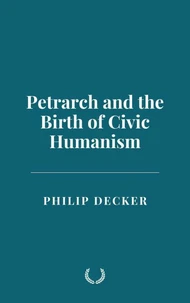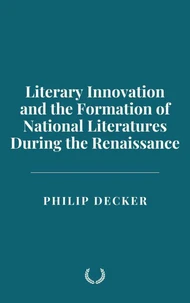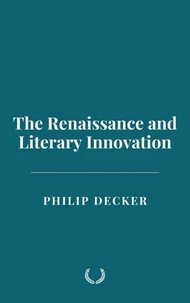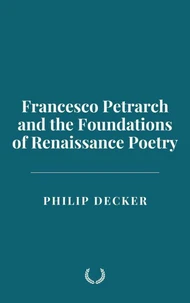The Humanist Curriculum: Grammar, Rhetoric, and Moral Philosophy in Political Thought
Par :Formats :
Disponible dans votre compte client Decitre ou Furet du Nord dès validation de votre commande. Le format ePub est :
- Compatible avec une lecture sur My Vivlio (smartphone, tablette, ordinateur)
- Compatible avec une lecture sur liseuses Vivlio
- Pour les liseuses autres que Vivlio, vous devez utiliser le logiciel Adobe Digital Edition. Non compatible avec la lecture sur les liseuses Kindle, Remarkable et Sony
 , qui est-ce ?
, qui est-ce ?Notre partenaire de plateforme de lecture numérique où vous retrouverez l'ensemble de vos ebooks gratuitement
Pour en savoir plus sur nos ebooks, consultez notre aide en ligne ici
- FormatePub
- ISBN8231469178
- EAN9798231469178
- Date de parution22/06/2025
- Protection num.pas de protection
- Infos supplémentairesepub
- ÉditeurWalzone Press
Résumé
The Humanist Curriculum: Grammar, Rhetoric, and Moral Philosophy in Political Thought reveals the transformative power of Renaissance education in shaping the ideals that underpin modern political leadership and civic engagement. Tracing the revival of classical learning through the triad of grammar, rhetoric, and moral philosophy, this groundbreaking work uncovers how humanist thinkers forged a new model of eloquence, ethics, and practical wisdom-one that continues to influence political education and discourse today.
From Petrarch's passionate rediscovery of classical virtue to Erasmus's Christian humanism, and from the rigorous philology of Lorenzo Valla to Machiavelli's stark political realism, this book offers a richly textured exploration of how education crafted leaders capable of navigating the turbulent politics of Renaissance Europe. It examines the vibrant humanist academies and schools where these ideals were transmitted and the enduring legacy that shaped republican thought, diplomacy, and governance across centuries.
Combining deep historical analysis with insights into language, philosophy, and political theory, The Humanist Curriculum invites readers to rediscover the roots of political eloquence and moral leadership. Whether you are a scholar, student, or engaged citizen, this book illuminates the timeless interplay between education, virtue, and power-offering a vital perspective on how the lessons of the past continue to inform the challenges of political life today.
From Petrarch's passionate rediscovery of classical virtue to Erasmus's Christian humanism, and from the rigorous philology of Lorenzo Valla to Machiavelli's stark political realism, this book offers a richly textured exploration of how education crafted leaders capable of navigating the turbulent politics of Renaissance Europe. It examines the vibrant humanist academies and schools where these ideals were transmitted and the enduring legacy that shaped republican thought, diplomacy, and governance across centuries.
Combining deep historical analysis with insights into language, philosophy, and political theory, The Humanist Curriculum invites readers to rediscover the roots of political eloquence and moral leadership. Whether you are a scholar, student, or engaged citizen, this book illuminates the timeless interplay between education, virtue, and power-offering a vital perspective on how the lessons of the past continue to inform the challenges of political life today.
The Humanist Curriculum: Grammar, Rhetoric, and Moral Philosophy in Political Thought reveals the transformative power of Renaissance education in shaping the ideals that underpin modern political leadership and civic engagement. Tracing the revival of classical learning through the triad of grammar, rhetoric, and moral philosophy, this groundbreaking work uncovers how humanist thinkers forged a new model of eloquence, ethics, and practical wisdom-one that continues to influence political education and discourse today.
From Petrarch's passionate rediscovery of classical virtue to Erasmus's Christian humanism, and from the rigorous philology of Lorenzo Valla to Machiavelli's stark political realism, this book offers a richly textured exploration of how education crafted leaders capable of navigating the turbulent politics of Renaissance Europe. It examines the vibrant humanist academies and schools where these ideals were transmitted and the enduring legacy that shaped republican thought, diplomacy, and governance across centuries.
Combining deep historical analysis with insights into language, philosophy, and political theory, The Humanist Curriculum invites readers to rediscover the roots of political eloquence and moral leadership. Whether you are a scholar, student, or engaged citizen, this book illuminates the timeless interplay between education, virtue, and power-offering a vital perspective on how the lessons of the past continue to inform the challenges of political life today.
From Petrarch's passionate rediscovery of classical virtue to Erasmus's Christian humanism, and from the rigorous philology of Lorenzo Valla to Machiavelli's stark political realism, this book offers a richly textured exploration of how education crafted leaders capable of navigating the turbulent politics of Renaissance Europe. It examines the vibrant humanist academies and schools where these ideals were transmitted and the enduring legacy that shaped republican thought, diplomacy, and governance across centuries.
Combining deep historical analysis with insights into language, philosophy, and political theory, The Humanist Curriculum invites readers to rediscover the roots of political eloquence and moral leadership. Whether you are a scholar, student, or engaged citizen, this book illuminates the timeless interplay between education, virtue, and power-offering a vital perspective on how the lessons of the past continue to inform the challenges of political life today.

